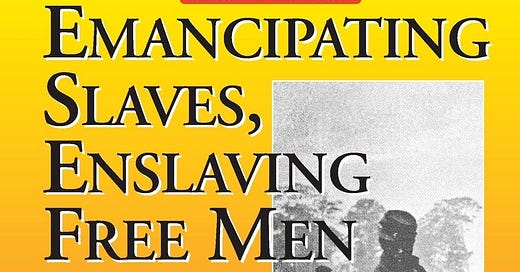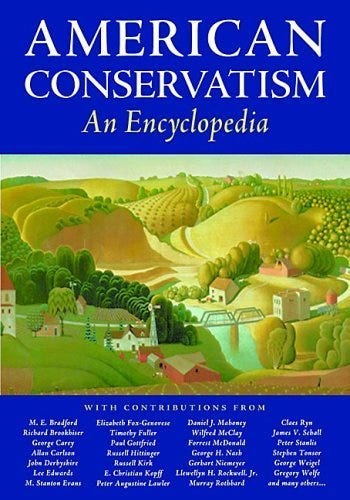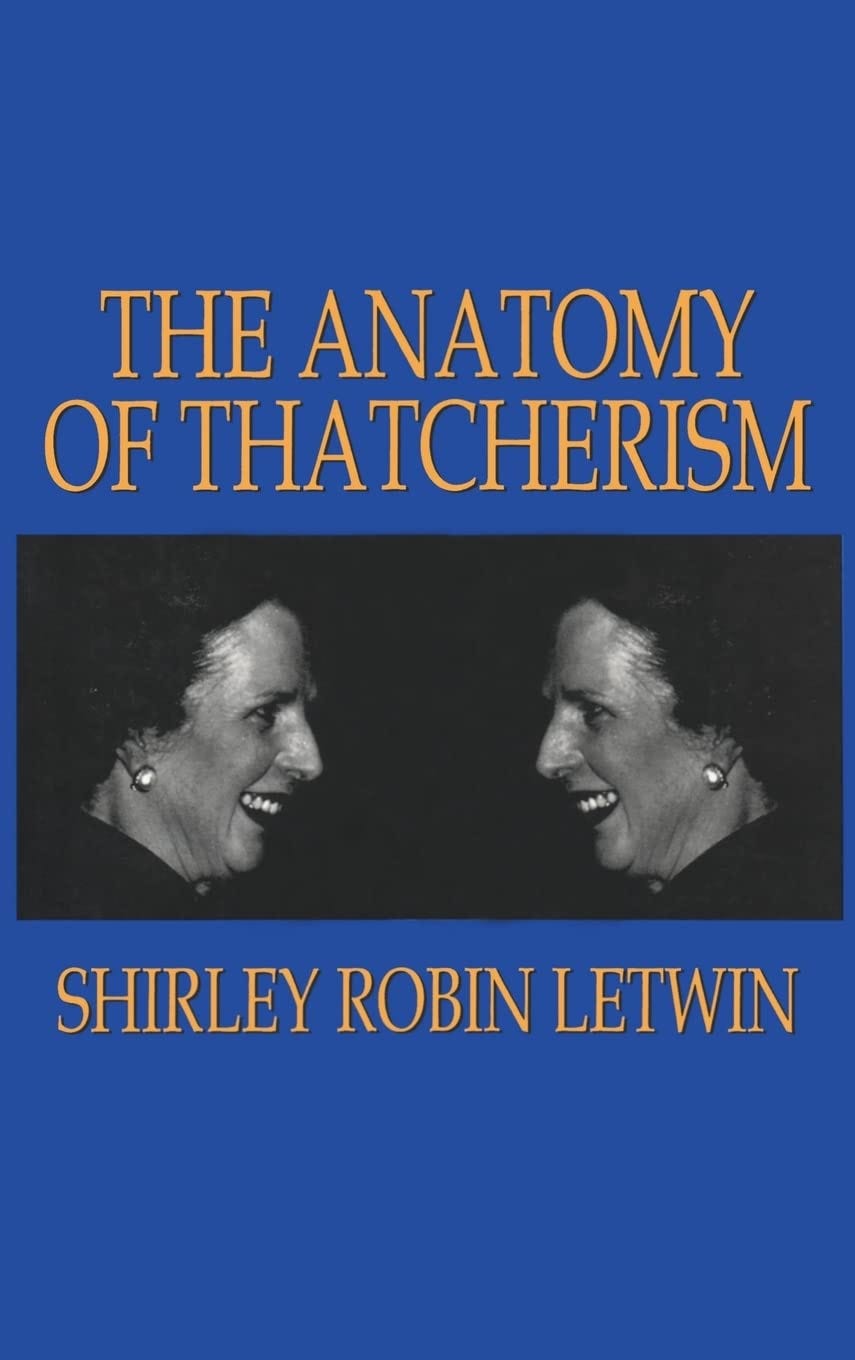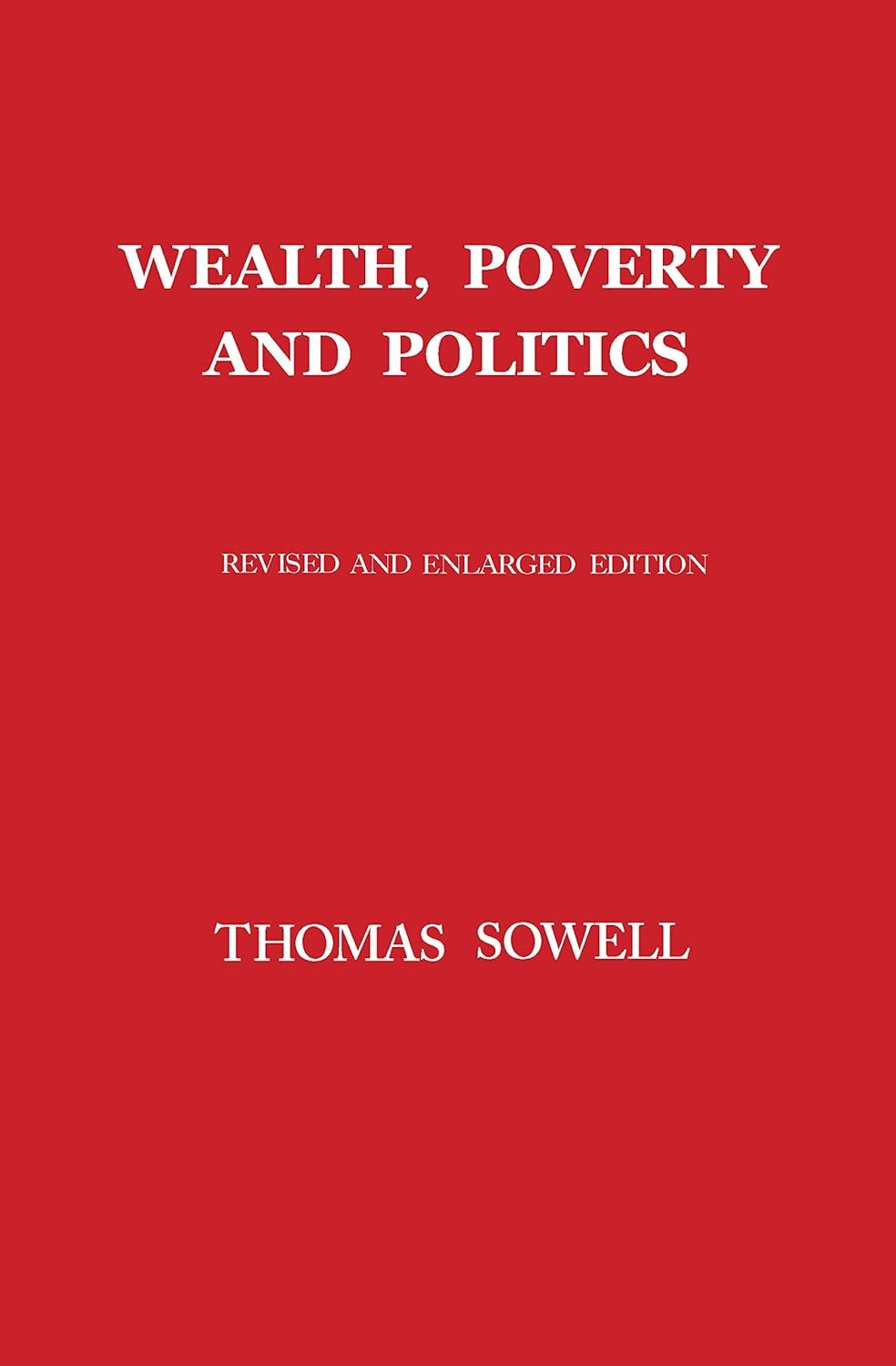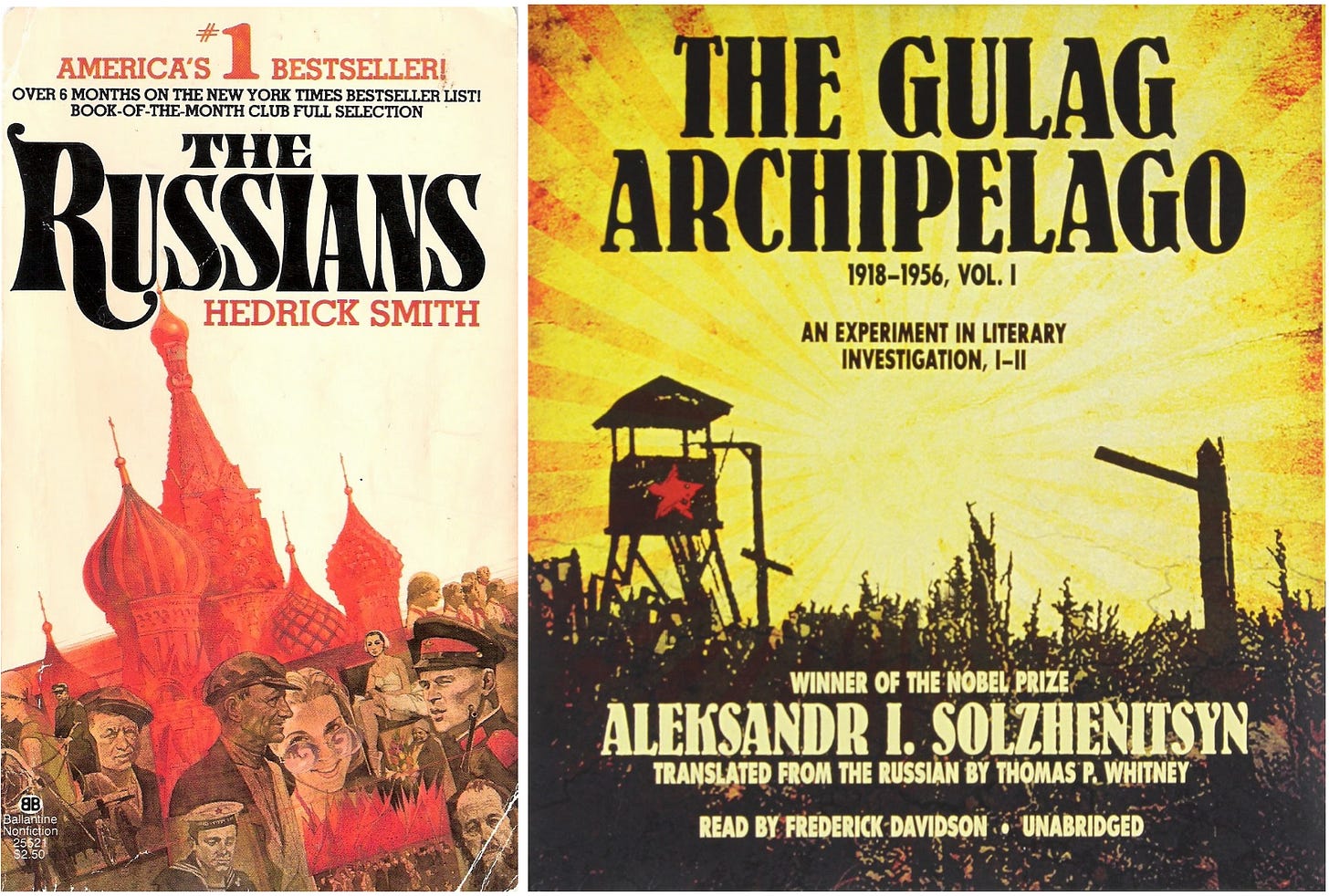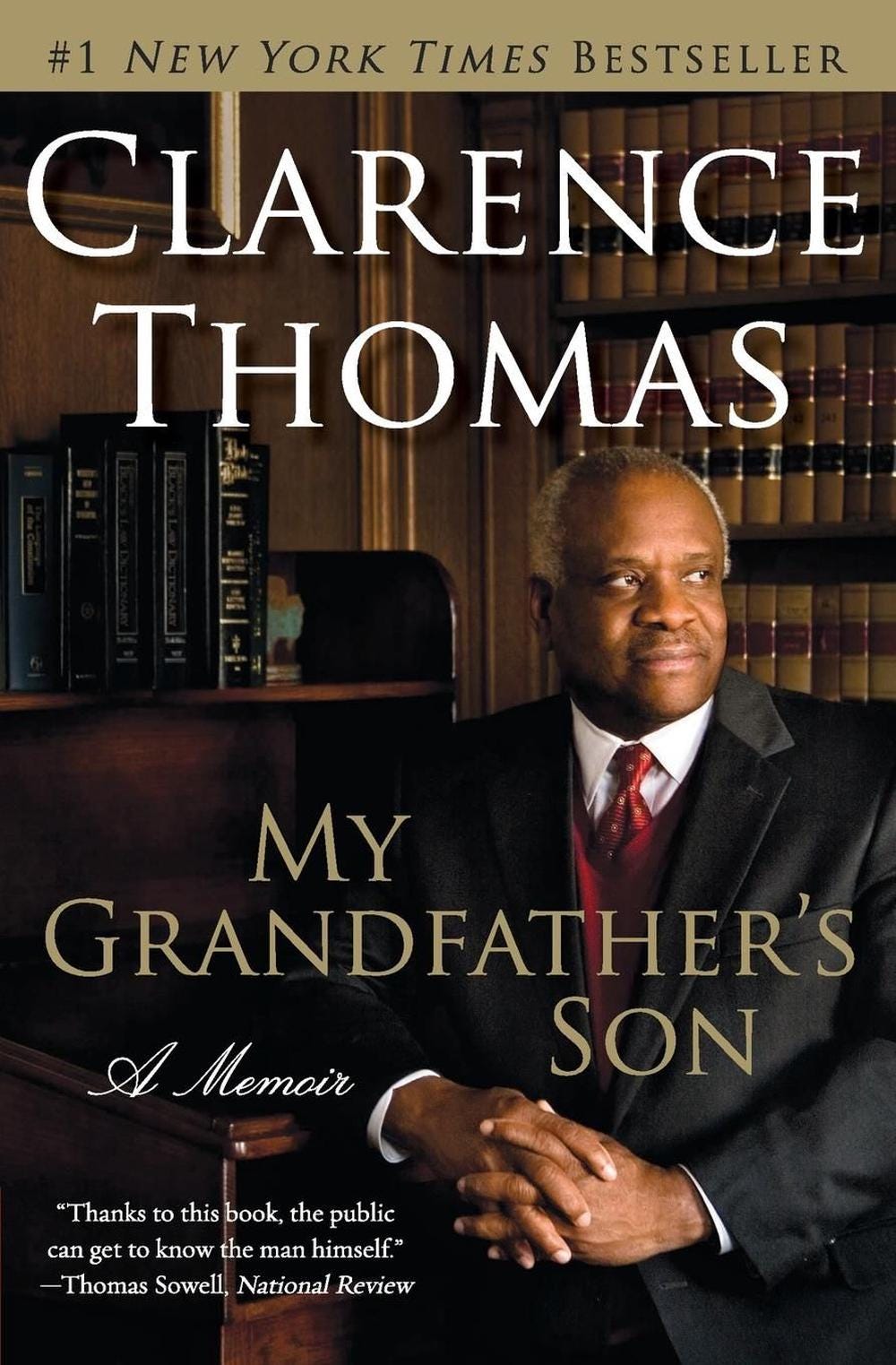What was your favorite book you read in 2023? Anything you’d recommend to me?
This is part two of the dozen (or so) best books I’ve read this year, in case you are looking for some last minute Christmas gifts!
[6] Emancipating Slaves, Enslaving Free Men by Jeffrey Rogers Hummel (a professor of economics)
An excellent, economically literate history of the Civil War that manages to simultaneously be sympathetic to the constitutional case for secession without being especially sympathetic to the Confederacy itself (both because of its defense of slavery and its practice of extensive war socialism). Of course, the Union doesn't get especially favorable treatment either. As Sherman said, war is hell.
Notes the classic fact that Confederacy had fraction of population and industry - but also argues it faced no worse odds than the American revolution. The problem was that Confederate West Pointers failed to wage a guerilla war like Washington did.
Perhaps the essential thesis of book is that if Lincoln had not resupplied Fort Sumter, the power dynamics in the north would have shifted toward compensated emancipation for the border states and then a refuge for escaped slaves that would have doomed the deep south hotheads. I simultaneously read the graphic history Battle Lines, which was a good introduction to the brutal conflict for mature children.
[5] American Conservatism: An Encyclopedia by Russell Kirk (on John Adams), Gertrude Himmelfarb (on Lord Acton), etc.
I grew up reading focused dictionaries and have lately been interested in returning to the genre. This is an excellent overview that I read cover to cover, though I’ll admit that by the time I got to Z I was very familiar with its particular choices about what strands of conservatism to include and exclude. The collection oversamples every possible fan ever of Edmund Burke and, probably as a result, takes a wrong path in its limited profiles of 19th century American history (mentioned in my previous email as a problem for Paul Johnson) that fails to consider the conservative case for Andrew Jackson or James Knox Polk. The editors are committed only to exploring conservatism’s American variants, though they can’t help but include some like Margaret Thatcher (a Lee Kuan Yew profile would also have been good).
And yet arguing with its selection is part of its charm, reinforcing the basic truth that American conservatism is multi-varied, probably lacking any set, shared definition. I was amused by profiles of historic publications without much more subscribers than this newsletter you are reading; I enjoyed the inclusion of historically important movements like the free China lobby that matter not much today; and I learned about various strands of conservatism that were new to me (like distributism, which I described in my previous email, though it strikes me as a philosophy that is hard to take out of early 20th century English Catholic circles).
Some familiar topics are covered really well (capitalism, capital punishment) and the editors even dangerously attempt a definition of conservatism itself (which is pretty good!). Other entries are more questionable: the gold standard isn’t written up by an enthusiast; public education is surprisingly embraced. And then there’s occasional extraordinary optimism for a book published in 2006: "The Democratic Party continues to wield enormous influence in American politics. As the popularity of liberal beliefs has declined, the Democratic Party has moved away from the far-Left policies of FDR and his New Deal."
If you are generally interested in the subject, also worth checking out The Conservative Intellectual Movement in America Since 1945 by George Nash (who also contributed to the encyclopedia)
[4] The Anatomy of Thatcherism by Shirley Robin Letwin (an American expatriate who worked for Thatcher)
An arresting take that attempts to resolve a central tension in conservatism: Politics is actually less about FREEDOM or any particular deontology but about advancing the nation-state as a productive enterprise and successful community. The right amount of freedom and virtue thus has a utilitarian political end. So, the author contrasts Thatcher against a purely libertarian vision because she is a friend of the police and army -- order and safety are paramount to a successful society. She is an enemy of drugs because they threaten virtue, especially industry. Thatcherism was not against unions so much as against favoritism for special interests. Though Thatcher proposed vouchers and they were rejected, she's somewhat skeptical of them because what she really wants is a rigorous classical education for all children. Ultimately, Thatcherism is about providing the framework for people to pursue their own ends in conjunction with positive social goals (so a natural ideal, both personally and nationally virtuous, is to encourage savings). Discovered via an Econ Journal Watch survey that asked “What 21st century works will merit a close reading in 2050?” See my review of Thatcher’s life beginning here.
[3] Wealth, Poverty, and Politics by Thomas Sowell (economist)
Bracing insights, per usual from Thomas Sowell, starting with a fundamental thesis: Inequality and poverty are the natural state of man and what should surprise and amaze us is the miracle of wealth, which we need to do our utmost to protect. A concern about inequality misses that poverty constantly gets redefined as a relative term -- and that if you doubled everyone's wealth, everyone would be better off but inequality would be worse. Poverty is a problem of production, not distribution.
The book does meander, but then you get more and more gold: Family integrity isn't a privilege, it's an achievement. Genetic determinism doesn't explain how China and Europe have been up and down relative to each other over time. Slavery is claimed to be America’s original sin but it is hard to find a sin less localized than slavery - what was peculiar to the west was its subgroup dedicated to (and eventually succeeding in) abolition. Once you’ve read enough Sowell, you do start to see some of the same arguments crop up again and again: but have you ever read enough Sowell?
[2] The Russians by Hedrick Smith (Moscow bureau chief for the New York Times in the early 1970s). The Gulag Archipelago by Aleksandr Solzhenitsyn (Soviet dissident)
When The Russians was published in the mid 1970s, the Soviets were thought to be near the height of their geopolitical power and American hawks worried we had fallen behind. But Smith reveals just how poor the Russians were and how broken their system was: the average person spent over 2 hours a day in line! More than 25% of the population lived in apartments they shared with another family. At one point, he visits a 5,000 worker factory and the manager proudly notes that there are a couple of dozen cars in the parking lot (in the U.S., every worker might have a car). "Money alone is not enough, you have to have something to spend it on” one scientist told him. A less accomplished Russian told him: “This is the workers' paradise. the greatest place in the world for workers to goof off. They can’t fire us!” Chapter after chapter of insight into the system as it was really lived. Education was very focused on technical topics but light on literature that might open up minds too much; in fact, training tattling was an official policy; and of course lots of social advancement for the stats. The Russians didn't understand Watergate, thought it was coup by hawkish Democrats. Incredibly in an officially atheist state, there were twice as many members of the Orthodox Church as the Communist Party. He also profiles leading dissidents, including Solzhenitzen.
I separately read The Gulag Archipelago this year - an amazing achievement of a book, written under surveillance without access to official documents, with real personality, about an extraordinary, arbitrary, evil system that doesn't get enough attention in the west (and the author says even in Russia they only focus on brief periods because millions of peasants lack a voice). The book is jerky and not always easy to read - but almost certainly because Solzhenitsyn was being actively persecuted. Story after story of realistic horror: Stalin’s security services had quotas for arrests and they filled them self-interestedly (who has best apartment? Cute wife?). Impossible for anyone to prepare against arrest because no one was guilty. Your only hope was to consider yourself already dead to make the interrogator afraid (an advantage that Christians seemed to disproportionately exercise). But your fate was still bound to be worse than death, stuffed into train cars for endless hours so tight that everyone must stand, sent into Siberia where the official policy was that no one had to work when the temperature dropped below negative 60 - but officials sent you out anyway to meet their quotas for other days.
The classic lines: "If only it were all so simple! If only there were evil people somewhere insidiously committing evil deeds, and it were necessary only to separate them from the rest of us and destroy them. But the line dividing good and evil cuts through the heart of every human being. And who is willing to destroy a piece of his own heart?"
And the calling out: "Someday our descendants will describe our several generations as generations of driveling do-nothings... First we submissively allowed them to massacre us by the mil-lions, and then with devoted concern we tended the murderers in their prosperous old age." The cutting observation: "In our country, the right to own private property was at one time just as effectively banished out in freedom too. (And then those who had banished it began to enjoy possessing things.)" And the contrast: it was safer to keep dynamite under the czar than shelter children of the enemies of Stalin.
The Russians may cause you to laugh out loud about how we could possibly have lost the Cold War; the Gulag Archipelago will introduce you to the heart of evil.
[1] My Grandfather’s Son by Clarence Thomas (Supreme Court Justice)
“I was nine years old when I met my father” is the opening sentence of the autobiography of America’s best Supreme Court justice ever. And it’s quite the emotional journey - I cried.
Thomas was born into rural poverty in segregated Georgia whose first language was gullah, but before too long had to move into urban poverty due to a house fire. Eventually, providentially, he goes to live with his grandfather, who is absolutely determined to impose the discipline necessary for Clarence to rise above his circumstances. But his very first day was spent with his brother continuously flushing the toilet, a marvel of indoor plumbing.
His grandfather Myers would sacrifice to send Clarence to Catholic school and Clarence performed so well that he became the first black student at the newly desegregated elite Catholic school - but Myers extracted a promise that he would only make it happen if Clarence “never quit.” Clarence continued to perform well, went onto a Catholic seminary, but distressed by the Catholic church’s lack of combating racism, he dropped out, which caused his grandfather to throw him out of the house. Thomas then enrolled in another college and wound up at Yale Law School (with the Clintons!) flirting along the way with the hard left, even charging his grandfather for being naive to racism. His grandfather asked how could Clarence be oppressed going to Yale? And insisted they lived in a great, even if flawed, country.
But Thomas soon grew disillusioned with the left’s violence, even more so when he felt his Yale JD wasn’t treated as valuable because he was black. He wound up working for the Republican Missouri Attorney General John Danforth, which led him to discover Thomas Sowell, serve in the Reagan administration, and eventually on the Supreme Court. Notably, even into the 1980s, he struggled with alcoholism, divorce, and financial management and, at least from his telling, it’s not clear that he was thoroughly vetted (the first time he really met George HW Bush, he was offered a position on the Supreme Court). The book also delves, of course, into the “high-tech lynching” of his nomination.
The 6th Circuit appellate judge Amul Thapar, who has written his own book about the humanity of people caught in legal cases that wind up at the Supreme Court and how Justice Thomas articulates originalism in a way that satisfies our sense of justice (even if he’s only in dissent), argues that people have missed Thomas’ strong black voice that rings from his personal experience - and you get to read it directly with this powerful memoir.
A mere ~8,000 pages to enjoy in 2024! Merry Christmas!
Thanks for reading! If you enjoyed this, forward it to a friend: Know anyone who enjoys nonfiction? How about someone looking for gift ideas this Christmas? Or do you know anyone who can read the English language?
For my best books of 2022, check out this article, which included the argument for why you might want to rent rather than own.
If you’ve received this email from a friend and would like more, sign up at www.grantreadsbooks.com or shoot me an email at grant@grantstarrett.com with the subject “Subscribe.” I read over 100 non-fiction books a year (history, business, self-management) and share a review (and terrible cartoons) every couple weeks with my friends. Really, it’s all about how to be a better American and how America can be better. Look forward to having you on board!

